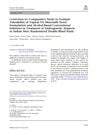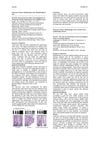Search
for
Sort by
Research
450-480 / 1000+ results
research Correction to: Comparative Study to Evaluate Tolerability of Topical 5% Minoxidil Novel Formulation and Alcohol-Based Conventional Solutions in Treatment of Androgenetic Alopecia in Indian Men: Randomized Double-Blind Study

research Comparative Study to Evaluate Tolerability of Topical 5% Minoxidil Novel Formulation and Alcohol-Based Conventional Solutions in Treatment of Androgenetic Alopecia in Indian Men: Randomized Double-Blind Study
New 5% minoxidil solution improves scalp hydration, reduces redness, and may be safer for sensitive users.
research Identification and Detection of Finasteride Polymorphs in Finasteride Tablets by FT-Raman Spectroscopy
Raman spectroscopy can identify finasteride polymorphs in tablets.

research Rare Case of Leydig Cell Tumor with Type I Diabetes Mellitus Causing Female Pattern Hair Loss
Woman with diabetes had hair loss due to rare ovarian tumor; surgery improved hair growth.

research Novel Protective Effect of Prostaglandin for Timely Hair Follicle Regeneration from Radiation Injury
Prostaglandin helps regenerate hair follicles after radiation damage.

research Efficacy and Safety of Once-Daily Minoxidil Foam 5% Versus Twice-Daily Minoxidil Solution 2% in Female Pattern Hair Loss: A Phase III, Randomized, Investigator-Blinded Study
Once-daily 5% minoxidil foam increases hair regrowth and density in women with hair loss, but not as effectively as twice-daily 2% minoxidil solution, though it's safer and more convenient.
research Faculty Opinions Recommendation of Efficacy and Safety of a Low-Level Laser Device in the Treatment of Male and Female Pattern Hair Loss: A Multicenter, Randomized, Sham Device-Controlled, Double-Blind Study

research A Randomized Clinical Trial of 5% Topical Minoxidil Versus 2% Topical Minoxidil and Placebo in the Treatment of Androgenetic Alopecia in Men
5% minoxidil works better for hair growth and density, with minor irritation.

research A Randomized, Placebo-Controlled Trial of 5% and 2% Topical Minoxidil Solutions in the Treatment of Female Pattern Hair Loss
5% and 2% minoxidil solutions effectively promote hair growth and reduce hair loss, with 5% being slightly more effective but having more side effects.

research A Randomized, Double-Blind, Placebo- and Active-Controlled, Half-Head Study to Evaluate the Effects of Platelet-Rich Plasma on Alopecia Areata
Platelet-rich plasma treatment significantly increased hair regrowth and decreased discomfort in alopecia patients, making it a potentially better and safer treatment option.

research Sulforaphane Mobilizes Cellular Defenses That Protect Skin Against Damage by UV Radiation
Sulforaphane from broccoli can help protect skin from sun damage.
research The Malignant Capacity of Skin Tumors Induced by Expression of a Mutant H-Ras Transgene Depends on the Cell Type Targeted
The risk of skin tumors becoming malignant depends on the specific skin cell type affected.

research A Phase I Study of Topical Tempol for the Prevention of Alopecia Induced by Whole Brain Radiotherapy
Tempol is safe and may prevent hair loss from brain radiotherapy.

research A Randomized Placebo-Controlled Multicenter Study to Evaluate the Safety and Efficacy of Finasteride for Male Chronic Pelvic Pain Syndrome (Category IIIA Chronic Nonbacterial Prostatitis)
Finasteride may help some male chronic pelvic pain patients, but more research needed.

research A Randomized Trial of Minoxidil in Chemotherapy-Induced Alopecia
Minoxidil shortens baldness from chemotherapy by 50.2 days without significant side effects.
research A Randomized Bilateral Vehicle-Controlled Study of Eflornithine Cream Combined with Laser Treatment Versus Laser Treatment Alone for Facial Hirsutism in Women
Combining eflornithine cream with laser treatment removes facial hair better than laser alone.
research Blinded, Randomized, Quantitative Grading Comparison of Minimally Invasive, Fractional Radiofrequency and Surgical Face-Lift to Treat Skin Laxity
Surgical face-lifts are more effective, but fractional radiofrequency is a good, less invasive alternative for treating skin laxity.

research Sex Differences in SARS-CoV-2 Infection Rates and the Potential Link to Prostate Cancer
Men, especially older ones with health issues like prostate cancer, may have worse COVID-19 outcomes and could benefit from therapies targeting male hormones.

research The Rationale for Inhibiting 5α-Reductase Isoenzymes in the Prevention and Treatment of Prostate Cancer
Inhibiting 5α-reductase can help reduce prostate cancer risk and improve treatment.

research Ultraviolet Radiation in Wound Care: Sterilization and Stimulation
UV radiation can help sterilize wounds and promote healing but requires careful use to avoid damaging cells.

research A Randomized, Single-Blind Trial of 5% Minoxidil Foam Once Daily Versus 2% Minoxidil Solution Twice Daily in the Treatment of Androgenetic Alopecia in Women
5% minoxidil foam once daily works as well as 2% minoxidil solution twice daily for female hair growth and is more convenient.

research A Randomized, Active- and Placebo-Controlled Study of the Efficacy and Safety of Different Doses of Dutasteride Versus Placebo and Finasteride in the Treatment of Male Subjects with Androgenetic Alopecia
Dutasteride 0.5 mg works better than finasteride and placebo for increasing hair in men with hair loss.

research Reproductive Seasonality and Maturation Throughout the Complete Life-Cycle in the Mouflon Ram (Ovis Musimon)
Mouflon rams mature gradually with changes in body, horns, and hormones linked to age and seasons, reaching full sexual maturity well after puberty.
research Co-Operation Between Follicular Ornithine Decarboxylase and v-Ha-ras Induces Spontaneous Papillomas and Malignant Conversion in Transgenic Skin
High levels of ODC and a mutant Ha-ras gene cause tumors in mice.

research A Randomized Double-Blind Placebo-Controlled Pilot Study to Assess the Efficacy of a 24-Week Topical Treatment by Latanoprost 0.1% on Hair Growth and Pigmentation in Healthy Volunteers with Androgenetic Alopecia
Latanoprost 0.1% may effectively treat hair loss.

research A Randomized, Double-Blind, Placebo-Controlled Trial to Determine the Effectiveness of Botanically Derived Inhibitors of 5-Alpha-Reductase in the Treatment of Androgenetic Alopecia
Natural 5AR inhibitors effectively improve mild to moderate hair loss in men.

research A Randomized, Double-Blind, Placebo-Controlled Trial to Determine the Effectiveness of Botanically Derived Inhibitors of 5-Alpha-Reductase in the Treatment of Androgenetic Alopecia
Plant extracts effectively reduce hair loss and increase growth, offering a safe alternative treatment.
research Epidermal Pigmentation in the Human Lineage as an Adaptation to Ultraviolet Radiation
Forensic DNA Phenotyping can help predict physical traits from crime scene DNA to identify suspects.

research The C3H/HeJ Mouse and DEBR Rat Models for Alopecia Areata: Review of Preclinical Drug Screening Approaches and Results
Both mouse and rat models are effective for testing alopecia areata treatments.